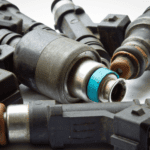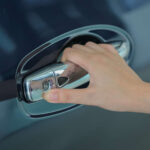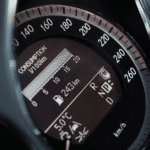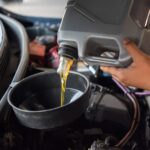Before you worry about brake fade and how it may affect you. Brake fade is not usually experienced by road-going family cars that get serviced at the correct intervals and driven sensibly.
But there are odd occasions where it could (which are all covered in detail in this article), so it is necessary to take my recommended precautions to prevent brake fade from ever catching you out.
What Is Brake Fade?
Brake fade is usually described as having ‘no brakes’ when pressing the brake pedal. Imagine driving as fast as possible to a corner, slamming on the brakes, but the car continues straight on without slowing down.
Brake fade will suddenly happen when repeatedly using the brakes through high-speed maneuvering or erratic driving. It affects different areas of the braking system but is all caused by the same issue: overheating brakes.
In a situation where you are driving with the brakes fading, you will press the brake pedal harder for an extended period, and the vehicle will fail to slow down as quickly. The more you press the pedal, the worse the brake fade gets. The brakes need a chance to cool and return to normal operating temperatures before they will work again.
Why Does Brake Fade Occur?
Drivers that have modified their cars tend to experience brake fade more than others, basically overpowered vehicles with underpowered brake systems, for example, on track days when a driver uses a road car without upgrading the brake fluid or the brake pad and rotors. Repeatedly asking the brakes to perform like an F1 car, without the brakes of an F1 car, will result in brake fade eventually.
Although brake fade doesn’t usually occur in everyday driving a standard car if the brake system is in good condition, there are a few instances when it can and does:
- Stop and start driving in an overloaded vehicle
- Towing heavy loads (higher than the vehicle rating)
- Driving down steep, long hills while pressing the brakes to slow the car down
- Driving aggressively
- Speeding and then repeatedly pressing the brakes hard
Some of these scenarios can be avoided to eliminate brake fade. The only one you might disagree with is driving down a hill, but the brake fade happens because the car is in high gear, so you press the brake pedal to slow the vehicle. Instead, keep the car in a lower gear and allow the engine and transmission to keep the speed down; there will be no need to press the brake pedal constantly.
The 2 Types of Brake Fade
There are two different causes of brake fade. Both start with overheating brakes but affect other areas of the brake system. A brake fluid issue can affect any road-going vehicle regardless of its fluid type. This is because the fluid is old and is below its minimum boiling point.
Brake pad fade
A brake pad surface can handle the heat of around 700 degrees, and certain brake compounds even break 1200 degrees. Brake pads rely on the friction of the pad surface onto the rotor to slow the car. So, as you can imagine, prolonged pressing of the brake pedal hard when driving quickly will result in a lot of heat generated at the wheel.
Once the pad exceeds the temperatures it can handle, it fails to create the friction required to slow the vehicle. Worse still, if the pads aren’t designed for this type of driving (like standard road car brake pads), the overheating will cause the surface to deteriorate and crumble away when cooled.
Brake fluid fade
Brake fluid fade is the overheating of the brake fluid. This happens because the heat generated by the brake pads during friction is conducted through the caliper, where the brake fluid is housed, causing it to surpass its boiling point. Brake fluid has a minimum and maximum boiling point. Once the fluid boils, the hydraulic brake fluid releases moisture, which means the brake fluid can be compressed (not good). As a result, the pedal travels further to the floor when you press it without slowing the vehicle.
Brake fluid fade is more common on road vehicles than brake pad fade, especially on cars where a brake fluid change is long overdue and the fluid minimum boiling point is reduced.
How to Prevent Brake Fade?
There are several ways to prevent brake fade, to start if the brake fluid is the problem. A complete brake fluid flush and replacing it with a higher DOT-rated fluid such as DOT5.1 would drastically reduce the chances of brake fluid fading. Equally, renewing the brake fluid with vehicle-recommended fluid will decrease the chances of brake fluid fading as the fluid’s boiling point is much higher in the newer fluid.
Sports car manufacturers have started using carbon ceramic brakes to eliminate brake pad fade, so upgrading the brakes will help. Replacing your fiesta brakes with carbon ceramic is not doable. However, performance road pads supplied by companies such as EBC or Pagid have a better tolerance to heat.
The brake rotors can also be replaced with drilled and grooved style brake rotors designed to dissipate the heat much faster.
This sounds great, but it’s not feasible on your average family car. The good news is keeping the brakes in good condition, ensuring the brake fluid is replaced every two years, and you drive sensibly. It is unlikely that you will ever encounter a brake fade situation.
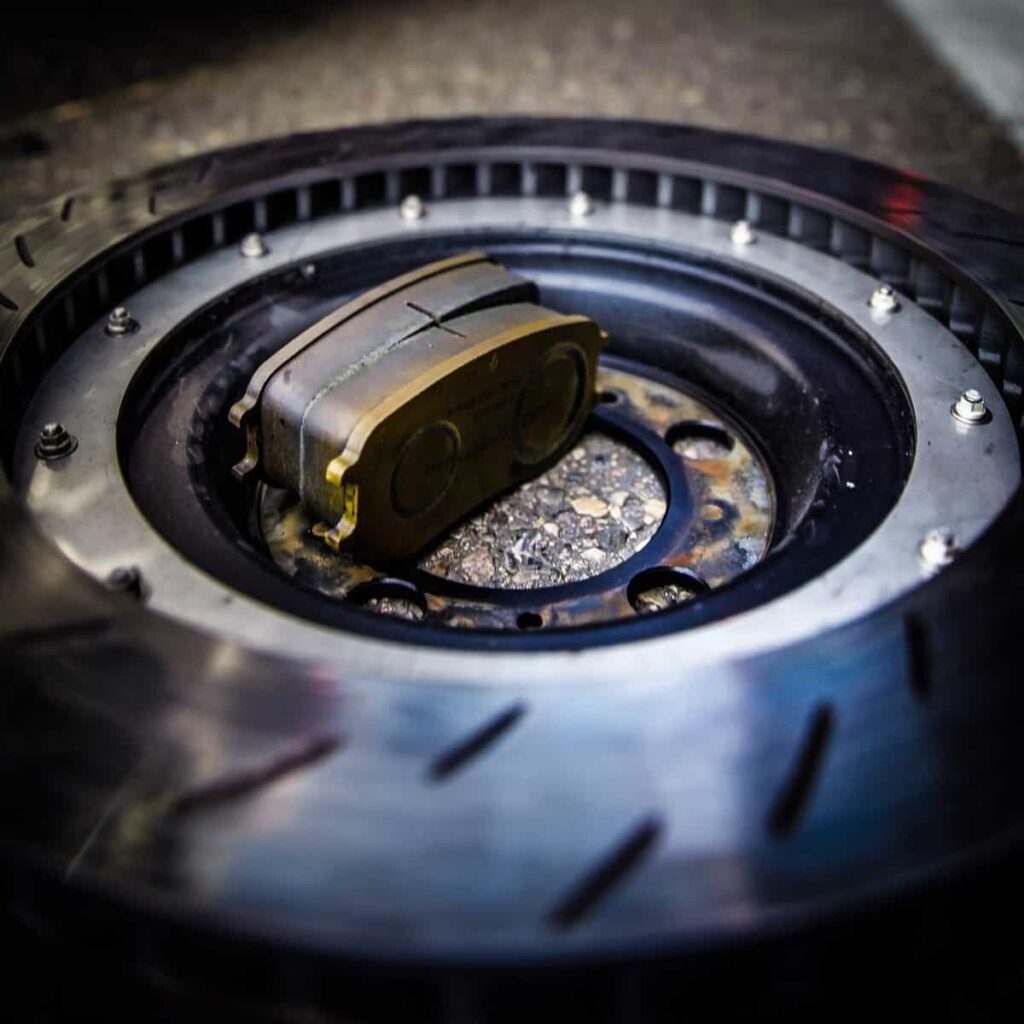
What Should You Do if the Brakes Fail Because of Brake Fade?
All of this happens in a split second. So, taking a course of action is tricky when driving, but pumping the brake pedal when in a brake fade situation may help release some heat immediately which may be enough to slow the vehicle. This isn’t something everyone can process when panicking cause the car won’t slow down, as it takes a lot of practice. The only way to stop brake fade is to stop pressing the brakes by pulling over or allowing the vehicle to remove the heat by carrying on driving.
Suppose you find yourself on a track day. In that case, most instructors at the circuit will only advise you to do a couple of laps of aggressive driving at a time and then do a cool-down lap or back into the pits to allow the car and brakes time to cool; after all, it may not have been designed for this purpose. This is also the same when driving aggressively on the roads; giving the car a chance to return to average temperatures after a few minutes of spirited driving will be enough to prevent brake failure.
Frequently Asked Questions
What Temperature Does Brake Fade Occur?
Standard vehicle brake pads usually have a fade point of around 350 degrees Celsius (662 degrees Fahrenheit), exceeding these temperatures will result in a brake fade situation.
Which Type Of Brakes Are More Prone To Brake Fade?
Drum brakes are more prone to brake fade, due to the design of the drum. Drum brakes do not dissipate the heat generated when braking easily or quickly. The higher temperature means the chances of the brake shoe surface fading when braking is increased.
Can Old brake Fluid Cause Brake Fade?
Yes, old brake fluid will have a higher moisture content which will cause the fluid to boil at a lower temperature. This increases the chances of brake fade happening under heavy braking.
Closing Thoughts
Brake fade is a hazardous situation to be in. If you’ve experienced it, I’m sure you’ll agree. Pressing the only pedal that will slow the vehicle down, and it doesn’t, is not cool.
So, do everything you can to prevent it, such as replacing the brake fluid every two years and with higher-spec fluid when possible, will help. As well as ensuring the brakes are in the best condition and if necessary replace with better-performing pads and rotors. Providing the car is well maintained, driving sensibly will stop you from ever encountering brake fade anyway.


